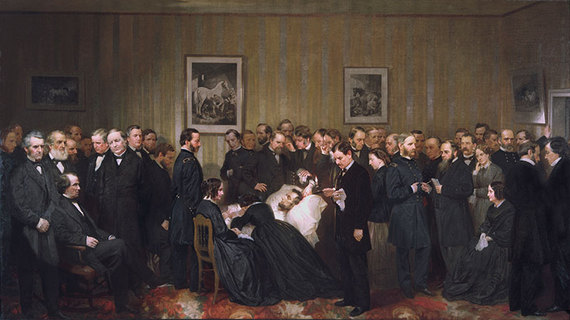"Abraham Lincoln has not fallen. He is lost to us but he is as Light and an angel with his Father and remains with us in memory and adoration and will so remain for ever."
-- Rabbi Samuel Adler,
Temple Emanu-El, New York, April 19, 1865
"Abraham Lincoln! That name ... will ever be coupled with a blessing, words of sympathy and sweet remembrance in every household; to the world it will prove a watchword, a tower of strength for men to rally around, to move them to combat manfully for right."
-- Rabbi M.R. Deleeuw,
Congregation B'nai Israel, New York, April 19, 1865

Alonzo Chappel, The Last Hours of Abraham Lincoln, 1868. Oil on canvas. Courtesy of the Chicago History Museum.
Abraham Lincoln was shot on April 14, 1865, in the midst of the Passover holiday. Because so many Jews were in synagogue when Lincoln died the following day, it seemed, as the Jewish social welfare leader Adolphus S. Solomons wrote, "a singular fact that it was the Israelites' privilege... to be the first to offer in their places of worship, prayers for the repose of [his] soul." Jews attending synagogues throughout America listened as rabbis likened Lincoln to Moses. "Like our own law-giver, Moses," as a sermon at Congregation Mikveh Israel noted, Lincoln "brought a nation to the verge of the haven of peace, and, like him, [was] not allowed to participate in its consummation."
In New York, authors of Passover sermons urged congregations to dedicate themselves to Lincoln's pious principles of self-sacrifice, mercy, and dedication to freedom and equality. New York's Jews had been divided during the Civil War, but they united in their grief behind this single, martyred leader whom God had given America at a time of crisis, and now had taken away. At Temple Emanu-El the congregation, according to The New York Times, "as if by a simultaneous impulse rose and repeated the Kaddish, a prayer for the nearest deceased relative." At Shearith Israel, Kaddish was also said. It was the first time in the history of American Judaism that these prayers were offered for anyone not of the Jewish faith. For a week beginning April 17, 1865, hundreds of organizations across the city met to express grief and pass resolutions in support of the government. As Jews filed by Lincoln's casket, in New York and at other stops along the route, which reversed the 1600-mile trek that had brought him from Illinois to Washington, D.C. in 1861, they experienced a personal loss.
How personal? Very personal, a new exhibition at the New-York Historical Society argues. And not simply in the wake of Lincoln's assassination. Lincoln, as the exhibition and its accompanying book by Jonathan Sarna and Benjamin Shapell demonstrate with copious examples, "interacted with Jews, commissioned Jews, trusted Jews, defended Jews, pardoned Jews, took advice from Jews, gave jobs to Jews, extended rights to Jews, revoked an expulsion of Jews, and even chose a Jew as his confidential agent." Indeed, Lincoln uniquely called, in writing, a Jewish man, Abraham Jonas, "one of his most valued friends."
Following Lincoln's death, New York became the nation's center for enshrining Lincoln's legacy for the ages. It is, for that reason, particularly fitting that Lincoln and the Jews be on view at New-York Historical during this year's 150th anniversary of his assassination. As a 2009 New-York Historical exhibition on Lincoln and New York showed, two romanticized images prevailed as part of his legacy. One showed the president with Mary and their children: like most fellow-citizens a man rooted in his family life, balancing the concerns of war with those of ordinary life. The second tied Lincoln to George Washington. Elevating Lincoln as the nation's "savior" to equal standing with its "father" smoothed over the crisis of disunion. God had blessed America, these images proclaimed, by providing Americans with such leaders at exactly the right moment.
In his apotheosis, printmakers identified Lincoln with patriotism, family life, and with the preservation of freedom and the destruction of slavery. As American Jewish communities prepare for Passover this year, this image of our American Moses makes good sense to recall. But recalling Lincoln, whose assassination shattered the nation's spirit -- exactly at the first moment it could taste victory and the return of peace -- also reminds us of the causes for which Lincoln lived and died, and by which his countrymen should live henceforth.
